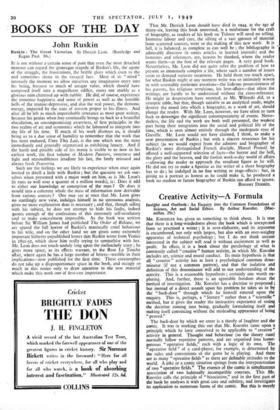BOOKS OF THE DAY
John Ruskin
IT is not without a certain sense of pain that even the most detached monster can regard the grotesque tragedy of Ruskin's life, the agony of the struggle, the frustrations, the brittle glory which even to the end sometimes shone in the ravaged face. Most of us " mind " intensely the moment we allow ourselves any imaginative entry into • his being, because so much of unique value, which should have composed itself into a magnificent edifice, stares out starkly as a glorious ruin cluttered up with rubble. He did, of course, experience the immense happiness and sense of power as well as the horrible hells of the maniac-depressive, and also the real power, the demonic energy, imparted by the state of tension proper to his illness. And after all he left as much imperishable utterance as most great writers, because his genius when free continually brings us back to a beautiful elucidation, an uncompromising awareness, of first principles in the two realms of art and economics which he laboured to integrate into the life of his time. If much of his work dismays us, it should bring us to a due sense of humility to remember that the work that has most endured, Unto This Last, is the one which was the most immediately and generally stigmatised as exhibiting lunacy. And if the harsh and pitiable side of his mania is visible to us now in his earliest work, the first volume of Modern Painters, sweetness and light and reasonableness irradiate his last, the lately reissued and always fresh Praeterita.
Such are the feelings we are likely to experience when once again invited to dwell a little with Ruskin ; but the question we ask our- selves when presented with a major work on him, as is Mr. Leon's (it runs to well over a quarter of a million words), is: Does it add to either our knowledge or conception of the man ? Or does it mould into a coherent whole the mass of information now derivable from various sources ? One may say at once that Mr. Leon gives no startlingly new view, indulges himself in no strenuous analysis, gives no more explanation than is necessary ; and that, though siding with his subject, he does not attempt to hide his faults, indeed quotes enough of the confessions of this extremely self-revelatory soul to make concealment impossible. As the book was written before Sir William James had published The Order of Release, we are spared the full horror of Ruskin's maniacally cruel behaviour to his wife, and on the other hand we are given some extremely important hitherto unpublished letters that Ruskin wrote from Venice in 1851-52, which show him really trying to sympathise with her. Mr. Leon does not touch unduly long upon the melancholy story ; he gives more space, as its effects warrant, to the Rose La Touche affair, where again he has a large number of letters—terrible in their implications—now published for the first time. These catastrophes do not take up a disproportionate space in the book, and occupy so much in this notice only to draw attention to the new material which make this work one of first-rate importance. That Mr. Derrick Leon should have died in 1944, at the age of thirty-six, leaving this book unrevised, is a misfortune for the craft of biography, as readers of his book on Tolstoy will need no telling. Immense labour and care, the sifting of a vast amount of material from scattered sources, went to the making of this new work. It is full, it is balanced, as complete as can well be ; the bibliography is admirably directive (it omits articles in learned journals) and the footnotes and references, are, heaven be thanked, where the reader wants them—at the foot of the relevant pages. A very good book. Nevertheless, Mr. Leon did not quite solve the problem of how to present so immensely complex a life, where such a number of issues seem to demand separate treatment. He held them too much apart, for what Ruskin might at any moment write was so intimately woven in with ostensibly irrelevant emotions—the hideous possessiveness of his parents, his religious revulsions, his love-affairs—that often the writings are hardly to be understood without the cross-reference. He might in desperation have resorted, as Mr. Wilenski did, to a synoptic table, but that, though suitable to an analytical study, might destroy the mood into which a biography, as a work of art, should plunge the reader. With Mr. Leon, however, we have often to turn back to determine the significant contemporaneity of events. Never- theless, the life and the work are both well presented, the weakest part being their integration into the social and political life of the time, which is seen almost entirely through the inadequate eyes of Greville. Mr. Leon would not have claimed, I think, to make a new presentation of Ruskin ; but with a sincere reverence for his subject (as we would expect from the admirer and biographer of Ruskin's most distinguished French disciple, Marcel Proust) he offered a well-supported selection of facts—the horror and the hell, the glory and the heaven, and the foolish work-a-day world of affairs —allowing the reader to approach the resultant figure as he will. He did not try to make a figurine as the writer of a short biography has to do ; he indulged in no fine writing or stage-effects: but, in giving us a portrait as honest as he could make it, he produced a book no student or future biographer of Ruskin can afford to ignore.
BONAMY DOBREE.






































 Previous page
Previous page